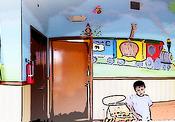As the pace of social change quickens, children are faced with new social and environmental risks to their growth and development. Of these changes, childhood poverty poses the greatest threat to children's well-being. One in four American children under the age of 3 years lives in poverty; (Haggerty 1999) a higher percentage of children live in poverty than any other age group. As pediatricians, we know that children in poverty experience a double jeopardy. First, they are more frequently exposed to risks to their health and development (such as lead poisoning, malnutrition, and family dysfunction). Second, children suffer more negative consequences (such as developmental delay and school dysfunction) from such exposure than do children with more advantaged socioeconomic circumstances. (Barry 2000)
Although recognition of and sensitivity to these risks have increased, primary preventive efforts, the cornerstones of pediatric practice, have failed to keep pace with changing circumstances. On the contrary, the pediatric primary-care clinician is asked to shoulder an ever greater burden in reducing the effects of social disadvantage on children--a trend that continues to increase as the social safety net for children has become increasingly porous.
The primary-care clinician is enjoined to provide anticipatory guidance, to perform developmental surveillance, to prevent unintentional injuries, to recognize and address parental substance use and depression, to solve issues of child abuse and family violence, to advocate with the school system and other social agencies, to manage behavioral and family issues, etc--all in the context of a 20-minute health supervision visit. Clearly there is a limit to a clinician's ability to address such a daunting agenda, and that limit has long since been exceeded, even for families without social disadvantages.
Perhaps the problem lies neither in the primary-care pediatrician's abilities or motivation nor in the multitude of clinical expectations, but rather in a...


